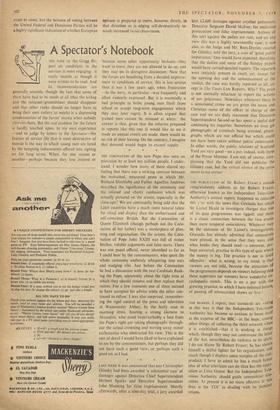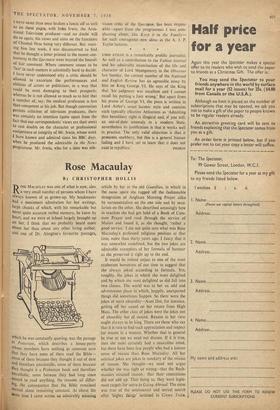LAST WEEK it was announced that one Christopher Glinsky had
been awarded 'a substantial sum' of damages against Detective Chief Superintendent Herbert Sparks and Detective Superintendent John Manning for false imprisonment. Shortly afterwards, after a nine-day trial, a jury awarded
any
Detective Sergeant David McIver, for malicious prosecution and false imprisonment. Actions of this sort against the police are rare, and view this was a highly newsworthy case; it was also, as the Judge and Mr. Rees-Davies, counsel for Glinsky, told the jury, a case of 'great public importance.' One would have expected, therefore, that the dailies and some of the Sunday papers would have carried detailed reports. The reporters were certainly present in court, yet, except lot the opening day and the announcement of the verdict, the case was hardly reported at all, ex- cept in The Times Law Reports. Why? The press is not normally reluctant to report the actions of our policemen. Nowadays whenever there is a sensational crime we are given the name and Christian name of the officer in charge of the case and we are daily reassured that Detective Superintendent So-and-so has spent a useful day continuing his inquiries. Sometimes we even get photographs of criminals being arrested, photo- graphs which are not official but which could not have been taken without police connivance. In other words, the public relations of Scotland Yard are very good—on a par, indeed, with those of the Prime Minister. I am not, of course, com- plaining (that the Yard did not publicise the Glinsky case, but the virtual silence of the press seems to me sinister THE PUOLICATION of Sir Robert Fraser's annual congratulatory address to Sir Robert Fraser, otherwise knoWn as the Independent Television Authority's annual report, happened to coincidet this y-ar with the news that Granada has asked Sir Lionel Heald to investigate'charges that one of its quiz programmes was rigged; and there is a closer connection between the two events than mere temporal coincidence. Whatever may be the outcome of Sir Lionel's investigations, Granada has already admitted that contestants were primed, in the sense that they were lold what books they should read—a common, per- haps universal, practice in this type of quiz where the money is big. The practice is not in itself offensive : what is, wrong, to my mind, is that viewers are not told, because the attraction of the programmes depends on viewers believing tha$ these supermen (or women) have wonderful en- cyclopedic minds. This is on a par with the growing practice, to which I have referred before, of passing off telerecorded shows as 'live.'
THE REASON, I repeat, tnat stanuards arc sliding in this way is that the Independent Television Authority has become so anxious to boost itself at the expense of the BBC—in the hope, among other things, of collaring the third network ■vheo it is established—that it is winking at things which, though they may not contravene the letter of the Act, nevertheless do violence to its Writ' I do not blame Sir Robert Fraser; he has shown himself a skilful fighter for his organisation. and much though 1 deplore some samples of the end- product, I have to admit he has a much belief idea of what television can do than has the oppo- sition at Lime Grove. But the Independent 1 Cle" vision Authority should guide commercial tele" vision. At present it is no more effective in this than is the TUC in dealing with its manlier unions. I HAVE MORE than once broken a lance, off as well as on these pages, with John Irwin, the Asso- ciated Television producer—and no doubt will do so again, his views and mine on the functions of Channel Nine being very different. But, meet- ing him last week, I was disconcerted to find that he thought a letter printed in the recent con- troversy in the Spectator went beyond the bounds of fair comment. Where comment ceases to be `fair' in such matters is admittedly hard to decide. I have never understood why a critic should be allowed to excoriate the performances and abilities of actors or politicians, in a way that could be most damaging to their prospects; whereas he is not allowed so much as to hint that a member of, say, the medical profession is less than competent at his job. But though convention permits criticism of television producers, there was certainly no intention (quite apart from the fact that our correspondents' views are their own) to cast doubts on the character or professional competence or integrity of Mr. Irwin, whose work I have known and admired since his BBC days, when he produced the admirable In the News programme. Mr. Irwin, who for a time was tele- vision critic of the Spectator, has been respon- sible—apart from the programmes I was com- plaining about, like Keep it in the Family— for such courageous new ideas as the A. J. P. Taylor lectures.



































 Previous page
Previous page